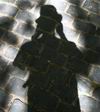I'm in Nouakchott, the capital of Mauritania. It is a dusty, dirty, poor place where goats wander the streets amongst the cars, everything happens at a slow pace, and the only thing to do is find the quickest way to leave. A border dispute in the 1960's between Mauritania and Senegal was resolved badly, leaving the Mauritanians without a capital so they built this one quickly. It's a dirt-poor (but sand-rich) country that mostly consists of the Sahara. The only foreigners here are aid workers, oil company employees, and a handful of travellers who foolishly thought crossing the Sahara overland would be a good choice for a trip.
In the south of Morocco, where I last wrote, I met up with two Slovenian guys who had decided on a whim one cold Slovenian afternoon to do the Sahara crossing, and early the next day took a flight to Morocco and hightailed it southward. I also met a Japanese guy who has travelled by ferry, train and bus from Japan to China, through Mongolia, Russia, Europe, to here. None of us had much idea about how we were going to find our way into and across Mauritania, where to stay, or how much to pay. None of us could speak Arabic or French, the two main languages around here. But the Slovenians told me a Slovenian saying: "The dumbest farmer has the biggest potatoes". I had no idea what that meant, so they explained that it means that somehow things go well for the ones who least deserve it.
We set off together and well, we had very big potatoes in an area where things can get very difficult for travellers. A Mauritanian guy gave us a lift in the back of his van on the 8 hour trip to the Mauritanian border and beyond. The van was way beyond being in usable condition and we expected to have a breakdown and get stuck in the desert. But we only had one tyre blow out, the repairs took half an hour and we got across the border 30 minutes before it closed for the night, which could have left us camping in the desert close to nowhere. Once we were across the border safely the driver and his wife were so happy to be back in their poor, hot, desert country they broke out into loud African song and started dancing while we drove past the car wrecks and abandoned pieces of less successful journeys.
Early the next day we found a driver with a reasonably good car prepared to take us onwards for the next 500 kms to Nouakchott, where I am now. My potatoes are still big - a couple of hours after arriving yesterday I found a couple of French guys, a Canadian, and an American going in my direction inland along the hopefully well-named "Route of Hope", and leaving in an hour or so from now. It's going to be the toughest part of my journey and will take three or four days until I am in a city worthy of the name, by which time I will be out of the Sahara.
The Sahara doesn't often look much like the postcard pictures and the scenery from "The English Patient". It has a surprising amount of variety. Sometimes it has lots of sparse shrubs, 100 kms later it might turn into a flat and barren sea of sand, then perhaps for 200 kms eroded rock formations dominate. Only sometimes do the classic yellow dunes make an appearance. Large herds of camels occasionally appear, or a solitary robed person can be seen walking from nowhere to nowhere. But mostly there is nothing to see, no activity except for a handful of drivers going along the only sealed road that crosses the Sahara from north to south.
Subscribe to:
Post Comments (Atom)

No comments:
Post a Comment